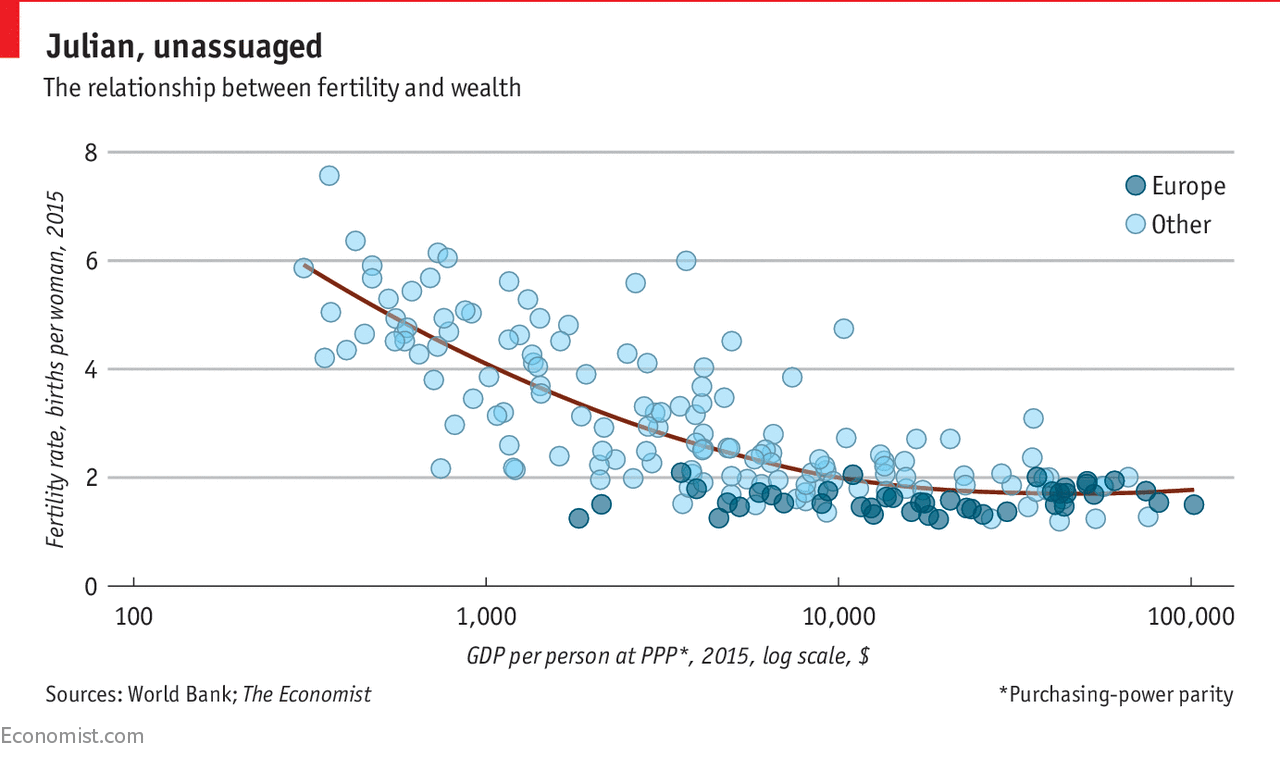JULIAN ASSANGE, the founder of WikiLeaks and apparently an amateur demographer, is worried about Europe’s declining birth rate. In a recent tweet he posited that “Capitalism + atheism + feminism = sterility = migration”, and noted that the leaders of Britain, France, Germany and Italy are all childless.
Never mind that Mr Assange needs a dictionary. “Sterility” means the inability to play a part in conception (often for medical reasons, or because a man has had a vasectomy or a woman has had her Fallopian tubes tied). What he presumably meant was childlessness, or perhaps a preference for fewer children—a preference, moreover, that until the advent of modern contraception women might hold but could not act on. Mr Assange’s tweet echoed sentiments expressed by RT (formerly Russia Today), a Kremlin-backed news organisation. Russian propagandists have long argued that the West’s declining fertility rate is evidence of its decline. A recent RT editorial claimed that “Europe has been committing protracted demographic suicide for several decades.” (Russia’s own fertility rate stands at 1.8 births per woman, not much above the western European average of 1.6.)
Critics responded sharply to Mr Assange’s tweet, countering that a country’s birth rate depends largely on how rich it is. But is there any germ of truth in what he said?
Birth rates are indeed highly correlated with national income. But the fertility rates of many European countries are lower than would be expected if GDP per person were the only factor that mattered. Romania, for instance, has 1.5 births per adult woman. Based purely on its level of economic development, that figure would be expected to be around 2.1.
What about the factors Mr Assange mentioned? Prosperity, capitalism, secularism and feminism all tend to be found in the same places. To try to distinguish the impact of each, The Economist tested their relationships with fertility rates across different countries. To measure religious observance, we used survey data from the Pew Research Centre, a think-tank. Levels of capitalism or feminism are harder to quantify, but an economic-liberty index produced by the Heritage Foundation, another think-tank, and a gender-equality index from the UN Development Programme may serve as proxies.
Once GDP per person was taken into account levels of capitalism, thus measured, did nothing extra to explain variations in birth rates. Both gender equality and the share of population that is irreligious did seem to play a part. But while the two traits may help explain why eastern European countries have far lower birth rates than Middle Eastern and Latin American ones with similar levels of income, neither was a meaningful predictor of fertility rates within Europe. Birth rates in egalitarian and irreligious Scandinavia are comparable to those in Catholic Italy, where women are expected to care for both babies and older relatives.
Countries in eastern Europe and East Asia, however, tend to have both low birth rates and negligible numbers of immigrants. The last step in Mr Assange’s equation makes no sense at all.
Never mind that Mr Assange needs a dictionary. “Sterility” means the inability to play a part in conception (often for medical reasons, or because a man has had a vasectomy or a woman has had her Fallopian tubes tied). What he presumably meant was childlessness, or perhaps a preference for fewer children—a preference, moreover, that until the advent of modern contraception women might hold but could not act on. Mr Assange’s tweet echoed sentiments expressed by RT (formerly Russia Today), a Kremlin-backed news organisation. Russian propagandists have long argued that the West’s declining fertility rate is evidence of its decline. A recent RT editorial claimed that “Europe has been committing protracted demographic suicide for several decades.” (Russia’s own fertility rate stands at 1.8 births per woman, not much above the western European average of 1.6.)
Critics responded sharply to Mr Assange’s tweet, countering that a country’s birth rate depends largely on how rich it is. But is there any germ of truth in what he said?
Birth rates are indeed highly correlated with national income. But the fertility rates of many European countries are lower than would be expected if GDP per person were the only factor that mattered. Romania, for instance, has 1.5 births per adult woman. Based purely on its level of economic development, that figure would be expected to be around 2.1.
What about the factors Mr Assange mentioned? Prosperity, capitalism, secularism and feminism all tend to be found in the same places. To try to distinguish the impact of each, The Economist tested their relationships with fertility rates across different countries. To measure religious observance, we used survey data from the Pew Research Centre, a think-tank. Levels of capitalism or feminism are harder to quantify, but an economic-liberty index produced by the Heritage Foundation, another think-tank, and a gender-equality index from the UN Development Programme may serve as proxies.
Once GDP per person was taken into account levels of capitalism, thus measured, did nothing extra to explain variations in birth rates. Both gender equality and the share of population that is irreligious did seem to play a part. But while the two traits may help explain why eastern European countries have far lower birth rates than Middle Eastern and Latin American ones with similar levels of income, neither was a meaningful predictor of fertility rates within Europe. Birth rates in egalitarian and irreligious Scandinavia are comparable to those in Catholic Italy, where women are expected to care for both babies and older relatives.
Countries in eastern Europe and East Asia, however, tend to have both low birth rates and negligible numbers of immigrants. The last step in Mr Assange’s equation makes no sense at all.

No comments:
Post a Comment